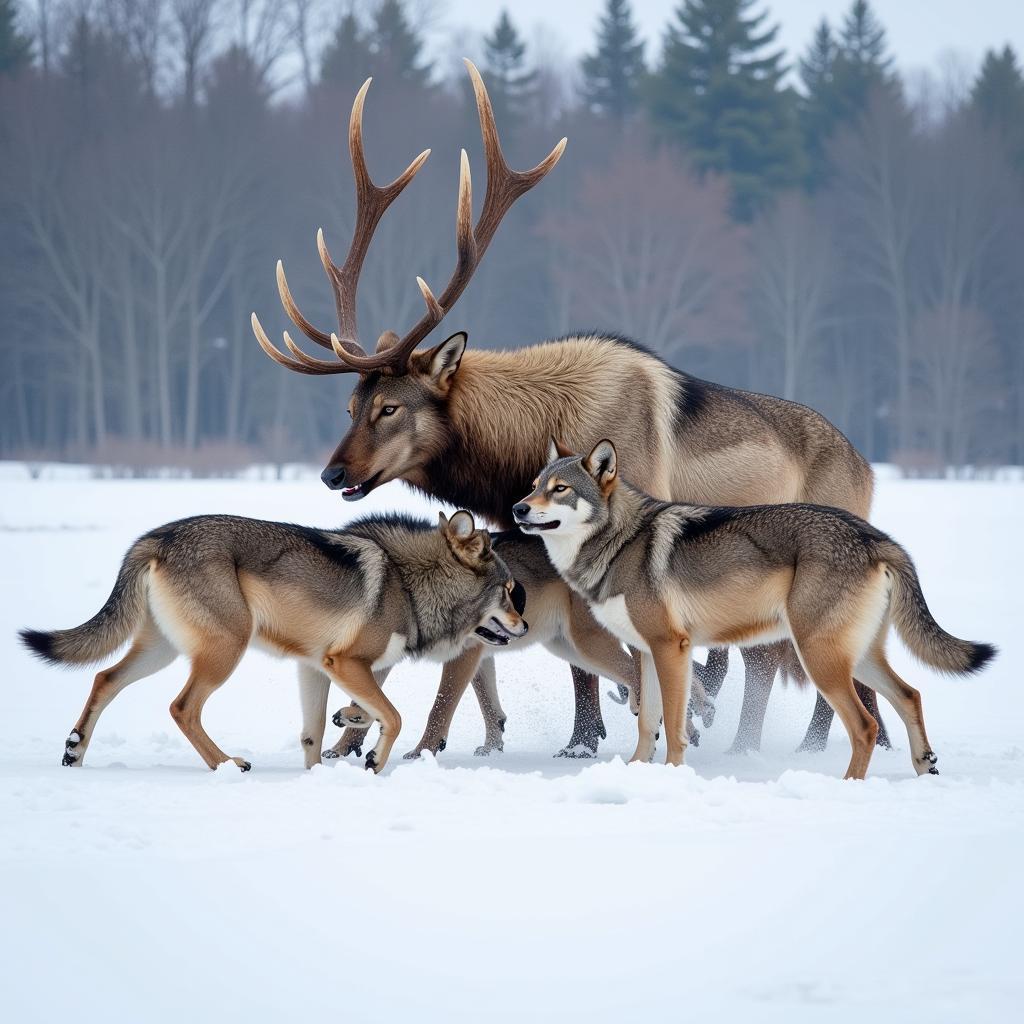Wolves, my favorite animal in English, hold a special place in my heart. Their intelligence, social complexity, and haunting beauty captivate me. From their powerful howls echoing through the forests to their intricate pack dynamics, wolves represent the wild spirit of nature. Let’s delve deeper into the fascinating world of these magnificent creatures.
Understanding the Allure of Wolves
What makes wolves so compelling? It’s a combination of factors, from their physical prowess to their complex social structures. Wolves are highly intelligent animals, capable of sophisticated communication and cooperative hunting strategies. Their loyalty to their pack is legendary, demonstrating a deep bond and sense of community. tả 1 con vật nuôi mà em yêu thích
The Wolf Pack: A Model of Cooperation
Wolves live in packs, typically consisting of a breeding pair and their offspring. This social structure allows for efficient hunting and protection of territory. Each wolf has a specific role within the pack, contributing to the overall success of the group.
- Alpha Pair: The leaders of the pack, responsible for breeding and making important decisions.
- Beta Wolves: Second in command, assisting the alpha pair and maintaining order.
- Omega Wolves: Often the scapegoats of the pack, but also play a vital role in diffusing tension and maintaining harmony.
 Wolf Pack Hunting Prey
Wolf Pack Hunting Prey
Why “Wolf” is My Favorite Animal Name in English
The very word “wolf” evokes a sense of mystery and power. Its sharp, single-syllable pronunciation is impactful and memorable. The word also carries a rich cultural significance, appearing in myths and legends across various cultures. This symbolic weight adds to the allure of the animal and its name. bạn thích không thích gì trong vai trò hiện tại
The Cultural Significance of Wolves
Wolves have been both feared and revered throughout history. They are often portrayed as symbols of strength, loyalty, and freedom. In some cultures, they are seen as guardians and protectors, while in others, they are associated with danger and darkness. This duality makes them even more fascinating.
Misconceptions about Wolves
Unfortunately, wolves often suffer from negative stereotypes. They are sometimes portrayed as vicious predators that pose a threat to humans. However, attacks on humans are extremely rare. bnaj thích tình tuiets nao nhất trong ba chàng ngốc Understanding the true nature of wolves is essential for their conservation.
- Expert Insight: Dr. Jane Williams, a renowned wildlife biologist, states, “Wolves play a crucial role in maintaining healthy ecosystems. Their presence helps regulate prey populations, preventing overgrazing and promoting biodiversity.”
The Importance of Wolf Conservation
Protecting wolves is vital for preserving biodiversity and maintaining the balance of nature. Their presence has a ripple effect throughout the ecosystem, impacting everything from vegetation to other animal populations.
In Conclusion: The Enduring Appeal of Wolves
Wolves, my favorite animal in English, embody the wild spirit and intricate beauty of the natural world. Understanding their importance and dispelling misconceptions is key to their survival. Let’s continue to appreciate and protect these magnificent creatures for generations to come. beé thích ăn vã
FAQ
- What is the average lifespan of a wolf? (Around 6-8 years in the wild)
- What do wolves eat? (Primarily large ungulates like deer and elk)
- How large can a wolf pack get? (Can range from a few individuals to over 30)
- Are wolves endangered? (Some subspecies are endangered or threatened)
- How do wolves communicate? (Through howls, body language, and scent marking)
- What is the role of the alpha wolf? (Leads the pack, makes decisions, and breeds)
- What is the scientific name for the gray wolf? (Canis lupus)
- Expert Insight: Dr. David Smith, a leading wolf researcher, emphasizes, “Conserving wolf populations requires a multifaceted approach, including habitat protection, public education, and responsible management practices.”
Khi cần hỗ trợ hãy liên hệ Số Điện Thoại: 0915063086, Email: [email protected] Hoặc đến địa chỉ: LK 364 DV 08, Khu đô thị Mậu Lương, Hà Đông, Hà Nội 12121, Việt Nam. Chúng tôi có đội ngũ chăm sóc khách hàng 24/7.